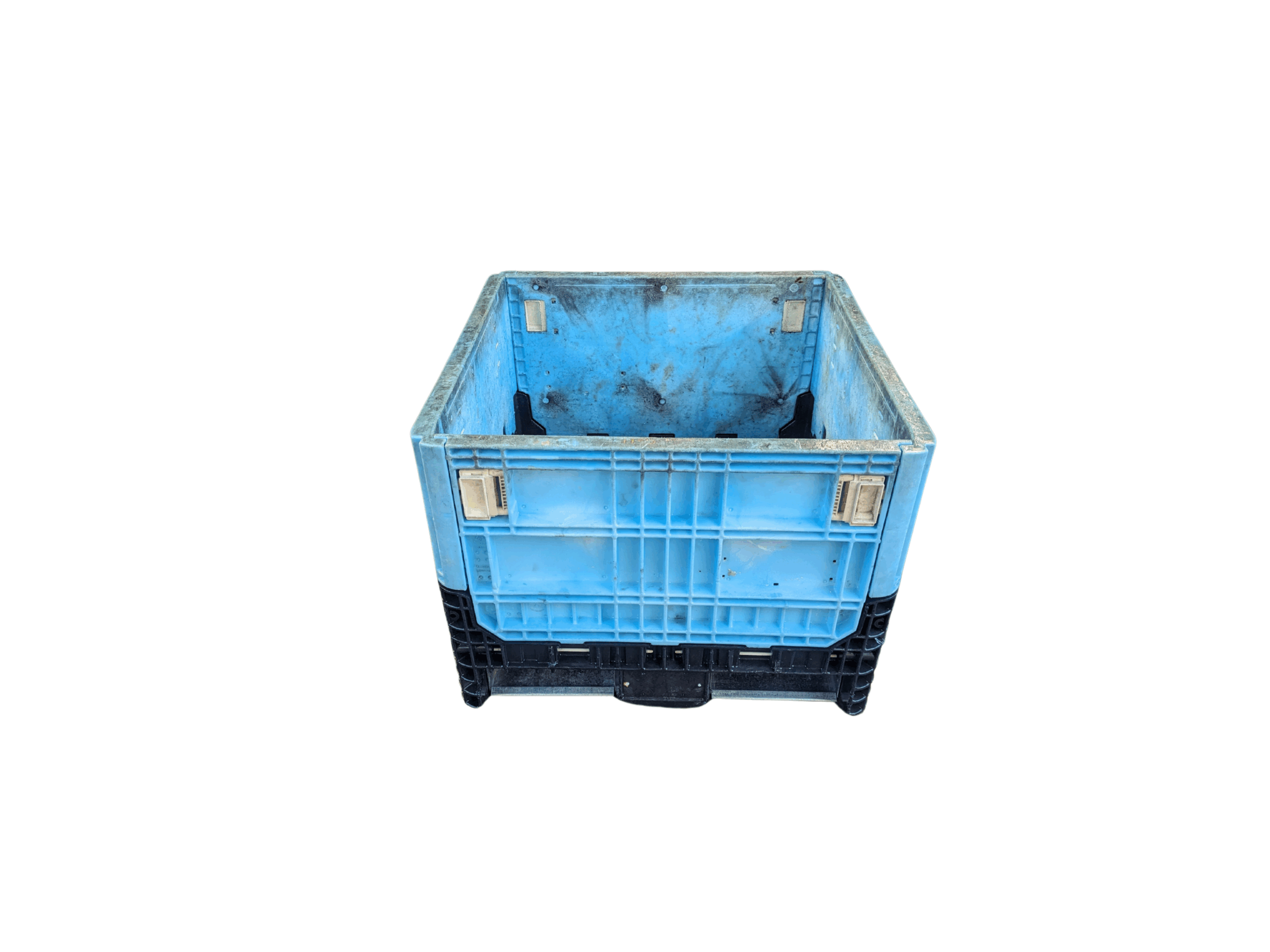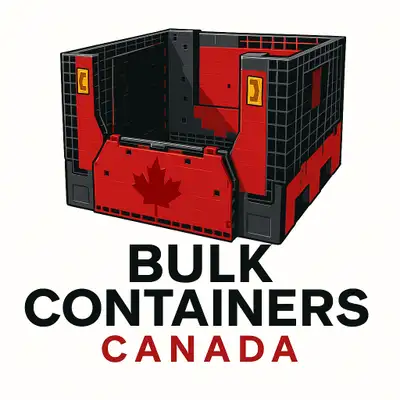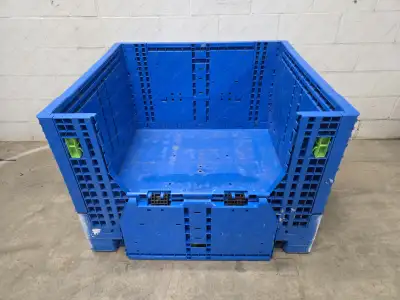Discover durable solutions with used plastic containers for organized storage
Wiki Article
Why Bulk Containers Are Essential for Cost-efficient and lasting Transport
Mass containers play a necessary role in modern logistics. They assist in the efficient movement of big quantities of items, thereby optimizing transportation processes. This technique not just minimizes prices however also lessens environmental effect via lower exhausts and waste generation. As markets seek more sustainable practices, the adoption of mass containers is becoming increasingly substantial. What effects does this change hold for future logistics and supply chain administration?
The Benefits of Utilizing Mass Containers in Logistics
Mass containers transform logistics by boosting efficiency and sustainability. These containers allow for the transportation of big amounts of items in a solitary trip, markedly minimizing the number of trips required. This not only improves procedures however likewise minimizes labor prices connected with handling, filling, and dumping. In addition, bulk containers are developed to optimize space utilization within transportation lorries, ensuring that even more products can be shipped concurrently.The standardization of mass containers also simplifies the logistics process. With consistent measurements, they can be quickly piled and saved, leading to improved warehouse monitoring. In addition, mass containers commonly include durable materials that secure components from damage during transit, thus lowering item loss and enhancing overall reliability. Because of this, companies can experience enhanced supply chain efficiency, ultimately leading to raised success and client complete satisfaction. This combination of variables makes mass containers a critical possession in modern logistics.
Ecological Impact: Decreasing Waste and Carbon Footprint
As industries increasingly prioritize sustainability, the adoption of mass containers has arised as an essential approach for decreasing waste and decreasing carbon footprints. These containers decrease the use of product packaging materials, such as boxes and plastic, consequently notably reducing overall waste generation. By combining deliveries, mass containers enhance transportation performance, permitting more products to be delivered per journey. This reduction in trips directly associates with reduced greenhouse gas exhausts, adding to a smaller sized carbon impact.Mass containers can typically be reused or reused, even more alleviating ecological impact. The toughness of these containers guarantees they can endure several transport cycles, minimizing the need for single-use choices. refurbished bulk containers. By improving logistics and promoting effective source use, bulk containers not only support lasting techniques yet likewise motivate markets to line up with international environmental goals. Inevitably, their execution mirrors a dedication to eco-friendly stewardship and liable resource management
Cost Savings: Exactly How Bulk Containers Lower Transport Expenditures
While lots of companies seek ways to boost their profits, making use of mass containers provides a substantial possibility for reducing transport expenditures. Mass containers make the most of the quantity of items delivered, enabling services to deliver larger amounts at the same time. This performance minimizes the number of journeys called for, directly lowering gas costs and decreasing labor costs associated with loading and unloading.Additionally, mass containers frequently include structured designs that maximize area usage within transport lorries. This indicates fewer vacant areas, resulting in much more efficient use of offered capacity. In addition, the durability of bulk containers can decrease the risk of item damage throughout transit, lowering losses and making sure that more goods arrive intact.
Enhancing Supply Chain Effectiveness With Bulk Storage Solutions
Mass storage options play a vital duty in enhancing supply chain effectiveness by maximizing supply monitoring. By consolidating products right into less, bigger containers, services can considerably minimize dealing with expenses connected with frequent transfers and processing. This streamlined method permits for far better monitoring and management of supply, inevitably leading to improved operational performance.Streamlined Stock Administration
Efficient stock monitoring is essential for maximizing supply chain operations, especially when companies embrace bulk storage space options. These services enable services to maintain greater supply degrees while minimizing the frequency of replenishment. By consolidating materials right into bulk containers, business can simplify their supply procedures, decreasing the intricacy connected with tracking several smaller bundles. This technique helps with precise stock counts and boosts projecting precision, permitting more informed decision-making. In addition, mass storage space services simplify warehouse company, making it less complicated to find and gain access to products when needed. Because of this, organizations can attain an extra effective inventory turn over rate, eventually enhancing total supply chain efficiency and lowering the probability of stockouts or overstock situations.
Decreased Handling Prices
The execution of bulk storage space options not only simplifies inventory administration yet likewise substantially reduces taking care of costs across the supply chain. By settling products into bulk containers, companies decrease the need for frequent handling and transfer between various storage and transportation units. This technique reduces down on labor expenses associated with loading, unloading, and moving smaller bundles. Furthermore, bulk storage minimizes the regularity of shipments, bring about lower transportation expenses and reduced gas intake. Because of this, businesses can optimize their logistics operations, permitting an extra reliable allocation of resources. Eventually, decreased managing expenses add to enhanced general supply chain performance, promoting a setting that sustains both sustainability and financial viability.
Flexibility of Mass Containers Across Numerous Industries
Lots of markets have distinctive needs for transportation and storage, mass containers have actually arised as a functional solution that meets a vast range of requirements. These containers, varying from big containers to specialized containers, can accommodate diverse materials, including fluids, powders, and granules. In the farming market, mass containers facilitate the transport of grains and fertilizers, while the food and beverage sector utilizes them for ingredients and ended up items. The chemical sector relies upon bulk containers for safely delivering harmful materials, making sure compliance with security policies. Furthermore, building firms gain from mass containers for moving aggregates and various other materials. Their adaptability reaches different modes of transport, consisting of ships, trains, and vehicles, improving logistical effectiveness. This flexibility not just streamlines operations across various sectors yet additionally promotes sustainability by decreasing packaging waste and maximizing room in transportation. As a result, bulk containers play a crucial duty in contemporary supply chain administration.Future Fads in Mass Container Usage and Sustainability
The future of mass container use is increasingly shaped by ingenious products advancement that improves sustainability. In addition, automation in logistics promises to enhance operations, lowering waste and improving performance. Embracing round economy methods will certainly even more change exactly how bulk containers are developed, used, and recycled, promoting a much more sustainable transport landscape.Ingenious Products Advancement
As markets increasingly focus on sustainability, innovative materials advancement wholesale containers arises as a significant element in improving environment-friendly transport services. Makers and scientists are exploring biodegradable plastics, recycled compounds, and light-weight steels to lower environmental effect. These materials not only decrease waste but likewise boost gas effectiveness by lowering the total weight of containers. Furthermore, developments in wise materials, which can adapt to varying conditions, enhance the longevity and capability of mass containers. The integration of these innovative materials lines up with circular economic situation principles, promoting reuse and recycling. As the demand for sustainable methods expands, the advancement of such products will play a crucial function in forming the future of mass container use in logistics and transport.Automation in Logistics
Substantial advancements in automation are poised to transform logistics and the usage of mass containers, improving sustainability in transportation. Automated systems, including drones and independent lorries, are simplifying the activity of bulk containers, decreasing the reliance on traditional fuel-powered transportation. These modern technologies optimize transmitting and filling procedures, reducing empty miles and boosting gas effectiveness. Additionally, automated supply administration systems improve monitoring and tracking of bulk containers, guaranteeing far better resource allocation and minimized waste. The combination of the Net of Things (IoT) permits real-time information analysis, making it possible for positive decision-making that aligns with sustainability objectives. As automation remains to evolve, it is expected to drive additionally developments in mass container usage, ultimately sustaining more lasting logistics practices and reducing the environmental impact of transportation.Circular Economy Practices
Developments in automation are setting the stage for an extra incorporated strategy to round economic climate techniques in the domain name of bulk container usage. As sectors significantly embrace sustainability, bulk containers are being designed for durability and reusability. This shift not just minimizes waste but also enhances resource efficiency. Firms are adopting techniques such as closed-loop systems, where used containers are accumulated, reconditioned, and reintroduced into the supply chain. In addition, wise modern technologies track container life cycles, promoting better management and decreasing environmental effect. The partnership between makers, logistics service providers, and end-users is essential in establishing requirements for sustainable container usage. used plastic containers. Future patterns suggest a growing focus on products that are biodegradable and recyclable, additional enhancing the round economy's principles in mass transport
Regularly Asked Inquiries
What Materials Are Bulk Containers Normally Made From?
Bulk containers are generally constructed from resilient materials such as high-density polyethylene, steel, light weight aluminum, and cardboard. These products offer protection, adaptability, and toughness, making them appropriate for delivering numerous items in different markets effectively.Exactly how Do I Select the Right Size Mass Container?
Choosing the appropriate size bulk container involves reviewing the quantity of materials to be transferred, considering handling devices compatibility, and evaluating storage area requirements. Proper dimension guarantees effectiveness in transportation and minimizes waste throughout delivery.Are Bulk Containers Reusable or Recyclable?
Bulk containers are typically recyclable, designed for several trips, enhancing sustainability. Many can additionally be reused, relying on the materials made use of. Selecting recyclable options better decreases and sustains ecological objectives waste in transport techniques.What Safety And Security Rules Relate To Mass Container Transport?
Safety and security laws for mass container transport include compliance with the Division of Transportation standards, appropriate labeling of unsafe materials, architectural stability assessments, and adherence to weight restrictions to guarantee secure handling and stop accidents during transit.Exactly How Can Businesses Change to Utilizing Mass Containers Efficiently?
Businesses can transform to bulk containers by assessing current logistics, training team on handling, buying ideal tools, enhancing stock monitoring, and read more working together with suppliers to ensure compatibility and efficiency throughout the supply chain.
As industries significantly prioritize sustainability, the fostering of bulk containers has actually arised as a key technique for decreasing waste and decreasing carbon impacts. By consolidating materials into bulk containers, business can improve their stock procedures, decreasing the complexity linked with tracking several smaller sized bundles. As markets significantly prioritize sustainability, innovative products advancement in bulk containers arises as a substantial factor in enhancing environment-friendly transport remedies. Automated systems, including drones and autonomous cars, are enhancing the activity of mass containers, minimizing the dependence on typical fuel-powered transportation. Additionally, automated inventory administration systems improve monitoring and monitoring of bulk containers, guaranteeing much better source appropriation and reduced waste.
Report this wiki page